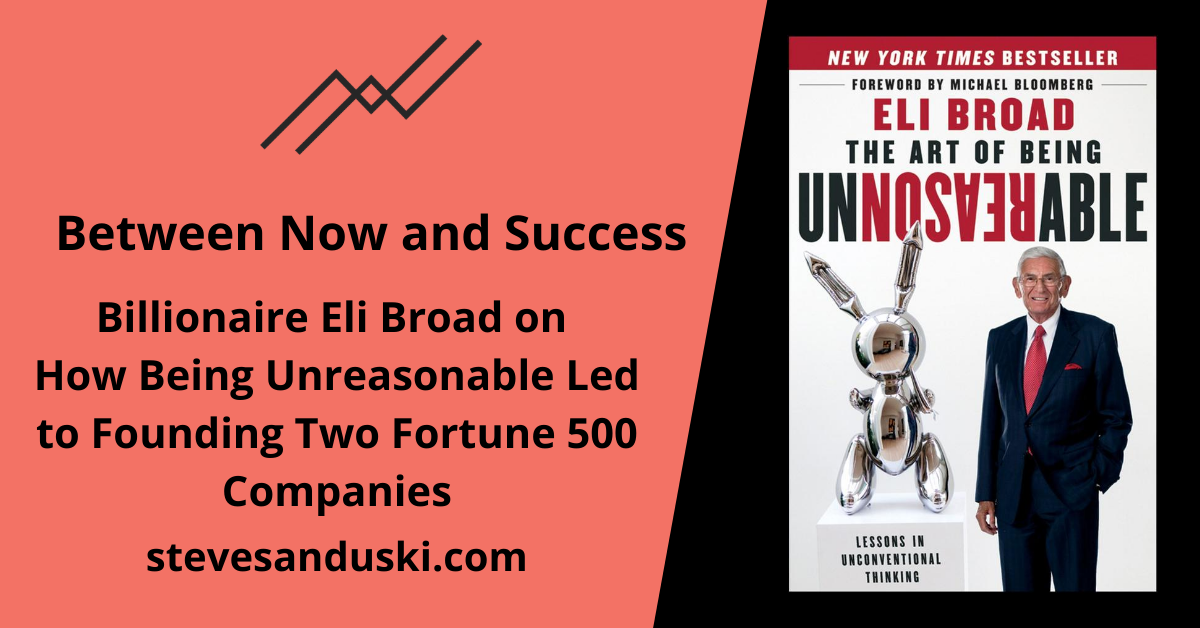Eli Broad is the billionaire founder of two Fortune 500 companies—Kaufman & Broad (now KB Home) and SunAmerica. You don’t reach that level of success by doing things just like everybody else does. Broad said ‘being unreasonable” led him to generate massive results.
Here are 7 key business insights from his autobiography, The Art of Being Unreasonable, that illustrate how you can apply “being unreasonable” to jumpstart your success.
1. In order to innovate, be unreasonable enough to ask fundamental questions about unexamined assumptions.
Start by looking at the most fundamental operating principles of your business., what most people would call the basics. They represent the strongest, stickiest, and most unexamined kind of conventional wisdom. Broad said this conventional wisdom has often gone so long without scrutiny that they’re accepted as gospel. That’s what makes these core assumptions the best place to look for opportunities to innovate.
Charging a fee for assets under management certainly qualifies as conventional wisdom and we are starting to see advisors innovate in this area. Podcast guest James Osborne now charges a flat annual fee of $5,100, updated from $4,500 for money management and planning services regardless of account size. Brittney Castro charges a planning fee and a monthly subscription fee. And Scott MacKillop, founder of TAMP First Ascent, is capping his asset management fee at $1,000 per household (updated) or $500 per account, regardless of asset size.
If you want to quickly gain visibility and new business, find a piece of conventional wisdom and be unreasonable enough to shake it up and find a new angle that appeals to a certain segment of your target audience.
2. The best way to take control of your time is to be extremely clear on what it is you must do.
There’s a big difference between what you could do and what you must do. Broad said when he was building Kauffman & Broad, his homebuilding company, there were only two things he had to do. First, he had to get 8 hours of sleep and second, he had to approve all the land purchases.
How about you? If you could only do two things in your business, what would they be?
Broad said what you have to do is less than you think. Thinking that everything is important will make 24 hours in a day seem inadequate. To narrow your must do list, it should include only the things that make you run, the things you could not live or work without, said Broad.
3. Being unwilling to delegate will torpedo the growth of your company.
Once you have identified your crucial tasks and sorted out your priorities, find a way to delegate everything else. Broad said the inability to delegate is one of the biggest problems he sees with managers at all levels.
I see this problem all the time in my role as an executive coach. Advisors often have trouble letting go of things that are below their pay grade. As Broad said, “Even if you think you can do it better, delegate anyway and try as hard as you can to close that gap by giving your colleague or employee the right feedback. Then recognize and accept that just because someone does something a little differently than you would, that does not mean it’s wrong. What counts is that your goals get accomplished at a sufficient level of quality. The only thing you should not delegate are your crucial tasks.”
4. Attract top talent by promising new employees fast growth—and then deliver it.
Nobody likes to work for a flat or sunsetting company. People want growth. It’s exciting and it leads to new challenges and opportunities. Slow and steady may help the tortoise beat the hare but it won’t attract difference-maker talent.
If you aren’t interested in targeting at least 15% top and bottom line growth each year, you should look at selling or merging your business with another company who’s focused on growth.
5. Attract top talent by promising new employees hard work and high expectations all the time.
Broad said, “Some employers think that the young are allergic to hard work or that they slavishly put in 16-hour days because they don’t have families yet. Neither is quite correct. Younger employees simply have fewer preconceived ideas of what they can and cannot do. I always try to widen their perspective, deepen their sense of accomplishment, and build their capacity.”
In my career (and in parenting), I’ve found that people usually rise to your level of expectation. If you set high expectations and provide support and honest feedback, people will often surprise you on the upside.
Tony Robbins says people overestimate what they can accomplish in one year but underestimate what they can accomplish over a decade. By being unreasonable in your goals—and supportive if they’re not met as long as the person gave it their all—you’ll get better results than simply shooting for slow and steady 10% annual growth. “If you let your employees fail without punishment, you will win their loyalty, their hardest effort, and their willingness to take risks with you,” said Broad.
“Your best motivator always is an unreasonably high goal. If you fail, just figure out why, learn your lessons, and move onto the next thing,” said Broad.
6. A string of successes can cause a big problem—complacency.
Just like when you fail, Broad says after a string of successes you should do the same thing—move on.
“Nothing breeds complacency quite like a string of successes. In that sense, success and failure can be equally dangerous–one can mobilize you with self-satisfaction and the other can paralyze you with fear. Think of them both as preparation for the next unreasonable challenge and use what you’ve learned to tackle it,” said Broad.
7. Being respected is more important than being liked.
Broad said respect is also easier to obtain. “You only have to hold yourself to high standards, treat people fairly, and get things done. And trust me, nothing patches over bruised egos and imagined slights like success. When your unreasonable focus accomplishes something, suddenly everyone is glad to be around you and eager for a share of the credit. Be as generous with credit as you are tightfisted with your time. It doesn’t cost you anything and leaves people eager for future collaborations.”
This is a tough one because most of us have an innate desire to be liked. Yet there are times when you’ll have to make tough business decisions that ruffle some feathers.
“Ruffled feathers should never get in the way of anything you really believe in and want to do. If you are starting a business or doing anything that flies in the face of conventional wisdom, you are going to get some pushback and sometimes even abuse. But if you stay the course, you will be surprised at how quickly success wins people over no matter what they think of you.”
Resources
– “The Art of Being Unreasonable: Lessons in Unconventional Thinking” by Eli Broad
– Values Clarification Toolkit Click here to download this FREE tool and start living your values.
This was originally published in 2016 and has been updated.





